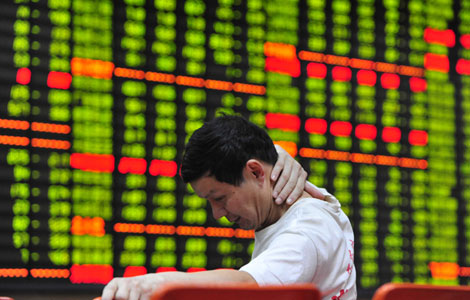
Despite continued opportunities in rapidly developing economies such as China, most investment banks will struggle to return to pre-financial crisis levels of profitability due to "severe" regulatory and market pressures, according to a report by Boston Consulting Group.
"Some players may be forced to exit the industry entirely, and many more will leave certain asset classes or gradually reduce their exposure and investments in unprofitable areas," the firm said in its Global Capital Markets 2013 report, released on Tuesday.
"In short, only the fittest will survive."
China last year generated almost half its investment-banking revenue from rapidly developing Asia-Pacific economies, BCG said.
"Hurdles", such as varying client and investor expectations, government influence and market fragmentation in the region, often hampered securities firms' efforts to achieve returns at levels seen before the 2008-09 financial crisis, the report added.
After-tax returns on equity, a measure of how efficiently a firm invests its clients' money, were once as high as 15 to 20 percent, but those levels appear to be "a thing of the past" for most firms, BCG said.
At the end of last year, the average after-tax ROE for the investment banking industry was 10 to 13 percent.
An estimated additional 3 percentage points of negative impact from regulation has yet to be absorbed, the report said.
"This means that institutions must make the right choice of core business model, undergo a rigorous portfolio review and revamp their operating models to reduce costs and increase efficiency if they hope to achieve returns on equity of 12 percent, the minimum that investors will require," the report said.
Philippe Morel, a BCG senior partner and a co-author of the report, said that although the market for investment banking services "will remain vital", the "value that banks will be able to capture will continue to shrink".
China has been gradually moving to ease regulations in its financial services industry as part of the country's shift to a market-driven economy.
Last fall's appointment of new members to the Politburo Standing Committee, which is responsible for national policy-making, was seen as a prelude to an opening-up of Chinese capital markets.
The recent reappointment of Zhou Xiaochuan as governor of the People's Bank of China - despite his having passed the mandatory retirement age of 65 for Chinese officials - was viewed as another endorsement of financial reform.
Zhou has championed market-based monetary policies and increased internationalization of the yuan currency.
Introduction of a China International Payment System, expected this year or next, could widen use of the yuan as a convertible currency in global business, further advancing regulatory reform.
Nick Gardiner, the Hong Kong-based head of BCG's Capital Markets Practice in Asia, told reporters in New York on Tuesday that some investment banks in the region have estimated that within three years, the yuan will become the currency used for about 30 percent of trade in China.
That could drive a significant increase in use of yuan-related investment products, he said.
Gardiner called China's gradual move to a financing model driven by securities markets "a positive trend".
"They recognize that the capacity for continuing through a purely bank-driven model is just not there because their banks, like everyone else's, actually have finite capital that they can deploy."
Increasingly blurred lines between banks, asset managers, securities brokers and private-equity firms will eventually encourage more competition, Gardiner said.
The performance of emerging markets offers long-term hope for the investment banking industry, but these economies are too small a group to compensate for weakness in developed countries, he said.
 HK's new cruise terminal receives luxury liner
HK's new cruise terminal receives luxury liner
 Future points to carbon trading
Future points to carbon trading
 Seafood businesses flounder amid spending cut
Seafood businesses flounder amid spending cut
 Equities slump amid slow-growth estimates
Equities slump amid slow-growth estimates
 Auto show opens with much fanfare in Xi'an
Auto show opens with much fanfare in Xi'an
 Sunnylands summit fuels Chinese tourism interest
Sunnylands summit fuels Chinese tourism interest
 'Palace on wheels' on sale for $3.13m in Dubai
'Palace on wheels' on sale for $3.13m in Dubai
 Fortune smiles on Chengdu as forum concludes
Fortune smiles on Chengdu as forum concludes